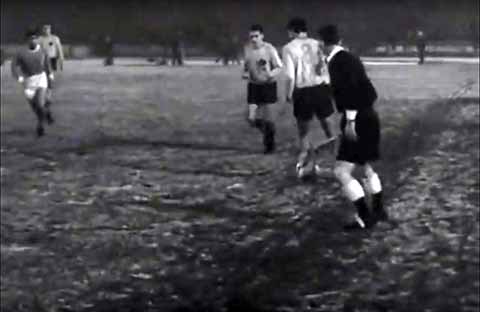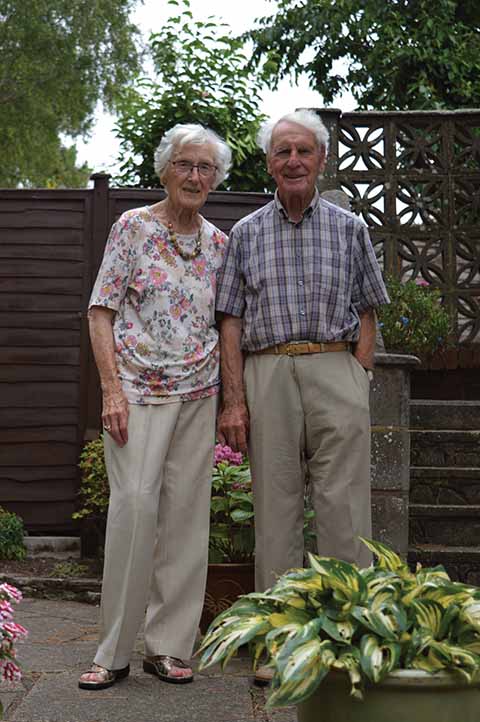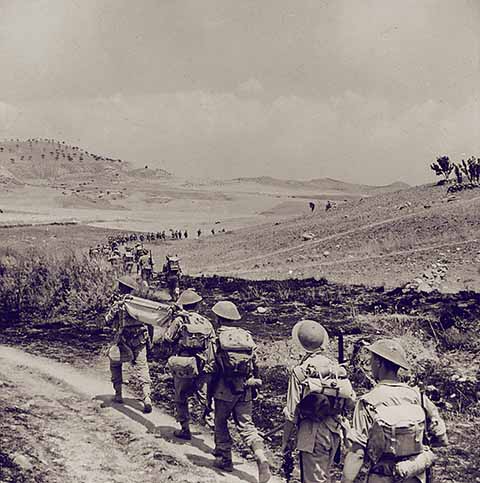Dorset Lives – He walked the line
Jasmine Sharland charts the life of football linesman and World War 2 serviceman David Saunders
Published in November ’19
NINETY YEARS ago, on his first day at Longfleet Primary School in September 1929, David Saunders began walking home as the noonday bell chimed. Five-year-old David had assumed that the lunchtime break was the end of the school day. Laughing, David recalls, ‘The teacher had to chase after me.’ He was sure to not make that mistake again.
Fourteen years later, David was crawling along the ground with his platoon during the invasion of Sicily. With each man grasping the boot of the man in front, no verbal command was necessary to stop the troops. When the boot in front stopped inching forward, all halted. Suddenly, David felt the column come to a standstill. After they had lain there for ‘what felt like all night’, the stern voice of the corporal demanded an explanation. One of the men realised he had been holding onto the foot of a dead German soldier.
David was born in June 1924 at Fernside Road, Poole. His father was a tram conductor who had served in World War 1 in what is now Afghanistan, where he contracted a disease which later affected his ability to work. Since money was tight throughout the 1920s with high rates of unemployment, David and his siblings’ small contributions (a paper round in David’s case) were essential to the family’s survival.
‘You knew your place in school,’ says David of the strict disciplinary measures, although he was appointed head boy. Sports always sparked his interest more than academic studies: he became captain of the football team and achieved first place in the Dorset county half-mile race. Banana and sugar with a slice of buttered bread might have been the reward for such extra-curricular achievements, as David fondly recalls this delicious treat made by his mother. On finishing school at the then leaving age of 14, he began working for the timber merchants, Sherry & Haycock. Masses of trains delivered timber to Parkstone and the company dealt with many local builders.
Newspapers and radio broadcasts were the main means through which people got news of current national and global affairs. David recalled catching the bus to his grandmother’s house with his father on a Sunday morning. Not far from Seaview, Upper Parkstone, a man suddenly yelled from the opposite side of the road, ‘We’re at war! Britain’s at war with Germany!’ It was 3 September 1939. Three years later, David would be conscripted and begin his training at Colchester barracks.
As part of Operation Husky, the first major Allied assault on Axis-controlled Europe, David sailed to Sicily with his regiment in July 1943. Throughout his time there he encountered horrific sights, but away from the front-line action, he was given time to rest and read letters from home. A letter from David’s eldest brother, Harry, who was in the RAF and aiding the Italian campaign, arrived. ‘I’m sure you must be in the area,’ his brother wrote, explaining he had seen David’s regiment number on trucks driving by. The brothers reunited twice: once in the city of Forli with the help of David’s sergeant-major, who offered to provide transport, and a second time by chance, bumping into one another in a nearby town. Their bond was extremely powerful: ‘I had to be lifted back onto the truck by fellow troops,’ David explains of his shock and distress at saying goodbye to his brother after their second, unanticipated reunion. ‘My legs stopped working.’ Fortunately, this wouldn’t be the last time David and Harry were reunited, as both survived the conflict and made it safely back home, soon establishing the tradition of Good Friday get-togethers with the entire family.

David running the line in Leipzig as FC Lokomotiv mount a successful attack against Benfica in the snow
While adjusting back to normal life after 1945, David was recommended by his father for a job at the Bournemouth Gas & Water Company. Desperate to leave the timber trade and gain a position in clerical work, David thought himself very lucky when he was offered the job: ‘It’s all about who you know, and who your parents know.’ Beginning his career on Old Christchurch Road aged 23, he gradually worked his way up to the respectable position of Chief Administrative Officer before retiring in 1984, although he still visited the branch from time to time during his retirement ‘to check up on the place’.
Outside the office, David would often attend dances at the ex-servicemen’s club in Lower Parkstone. The gentlemen would usually stand just inside the door, observing rather than joining in with the ladies. Other dances were held at the Centenary Hall and the Conservative Club in Poole every Saturday. David recalls that one particular Saturday evening in the late 1940s, one lady dancing with her two friends caught his eye. David bravely introduced himself and asked her for a dance. Her name was Marian and the two went on to marry on 3 September 1949, celebrating a remarkable 70 years of marriage this year. Initially they lived with Marian’s mother on Ashley Road before settling into a newly-built bungalow and going on to have two children of their own.
David’s passion for football returned in the post-war period and he began refereeing for local county matches in the early 1960s. He was recognised by officials as being very competent and on one occasion his talents were commended particularly. He was refereeing a game between Portland and Salisbury when he saw a Portland player deliberately kick a member of the opposing team. David immediately sent the offender off the pitch, doing his best to ignore the loud protests of the Portland spectators. At the end of the match, a man made his way out onto the pitch to congratulate David on his handling of the misconduct. It turned out that this individual was assessing the match for the Football Association and within days, David received a phone call offering him the position of linesman in the Football League. David remembers, ‘It’s about doing the right thing in the moment’.
Travelling up and down the country, David visited nearly every London club, including both Arsenal and Tottenham. He also officiated at countless matches for teams such as Reading, Swindon, Bristol and Bath.
In December 1966, David and two other FA officials landed in East Berlin to adjudicate at a European Fairs Cup match between FC Lokomotiv Leipzig and SL Benfica. Upon arrival, they were met by two ‘local gentlemen’ who took them through passport control. One man explained that he was a taxi driver who would accompany David and his associates for the duration of their stay, while the other individual would be sleeping outside their rooms. The Cold War was at its height and this tight surveillance by East German secret police, known as the Stasi, was common throughout the 1950s and 1960s. The two locals never left their side, even escorting David to and from evening meals, sitting at the table nearest the exit: ‘We couldn’t leave, even if we wanted to.’
The game itself proved to be action-packed, beginning with an own goal scored by a Portuguese player. Then Benfica scored, but a strong attacking force from Leipzig nabbed two more goals, the final score being 3-1 to the home team. Serious concentration by the linesmen was crucial that day, and it’s just as well David didn’t try to walk home during half-time!



